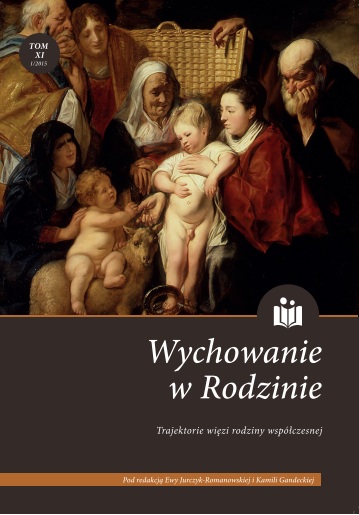Rodzicielstwo na rozdrożu? O ojcostwie i macierzyństwie w ponowoczesnym świecie
Parenthood at the crossroads? About fatherhood and motherhood in the postmodern world
Author(s): Małgorzata H. HerudzińskaSubject(s): History, Social Sciences, Sociology, Family and social welfare
Published by: Zakład Historii Edukacji w Instytucie Pedagogiki Uniwersytetu Wrocławskiego
Keywords: modern family; demographic winter; socialization; upbringing; parenthood; family and child supporting institutions
Summary/Abstract: The demographic winter is a considerable challenge for modern societies, going beyond the borders of developed European countries. The decision to have offspring is a great challenge. At the same time, the arrival of a child into a family is more and moreoften perceived as an extraordinary event and entails actions reflecting a special care ofthe child’s healthy development. The reasons for this include a diminishing birth rate which has led to the deficit in simple demographic renewal and an increase in the number of single parent families.The birth of (the first) child induces the process of spouses’ (partners’) assuming parental roles. Bearing in mind the age and development of their child, they fulfil child care and parenting duties, create suitable conditions for learning, encourage the child to make progress at school; they also should devote their time and attention to the child’s problems, talk to them and, in having their trust, teach the child responsibility. The number of tasks assumed by the child’s carers and the extent to which they are fulfilled are determined by both intra-family factors and those from outside the family. Child rearing patterns have changed significantly, which is reflected in amendments to legal regulations or experts’ discussions on methods of child rearing. In view of the above, the following questions have been asked: To have or to not have children? To what extent modern parents fulfil the above and other tasks connected with their offspring? What child rearing patterns do they prefer? How do they assess themselves as fathers/mothers? What roles do family and child supporting institutions (first of all, educational establishments including the nursery, kindergarten and school) have in the socialization of the youngest? The answers to some of these questionsare based on the analysis of secondary data and on the researcher’s own study.
Journal: Wychowanie w Rodzinie
- Issue Year: XI/2015
- Issue No: 1
- Page Range: 51-78
- Page Count: 29
- Language: English, Polish

